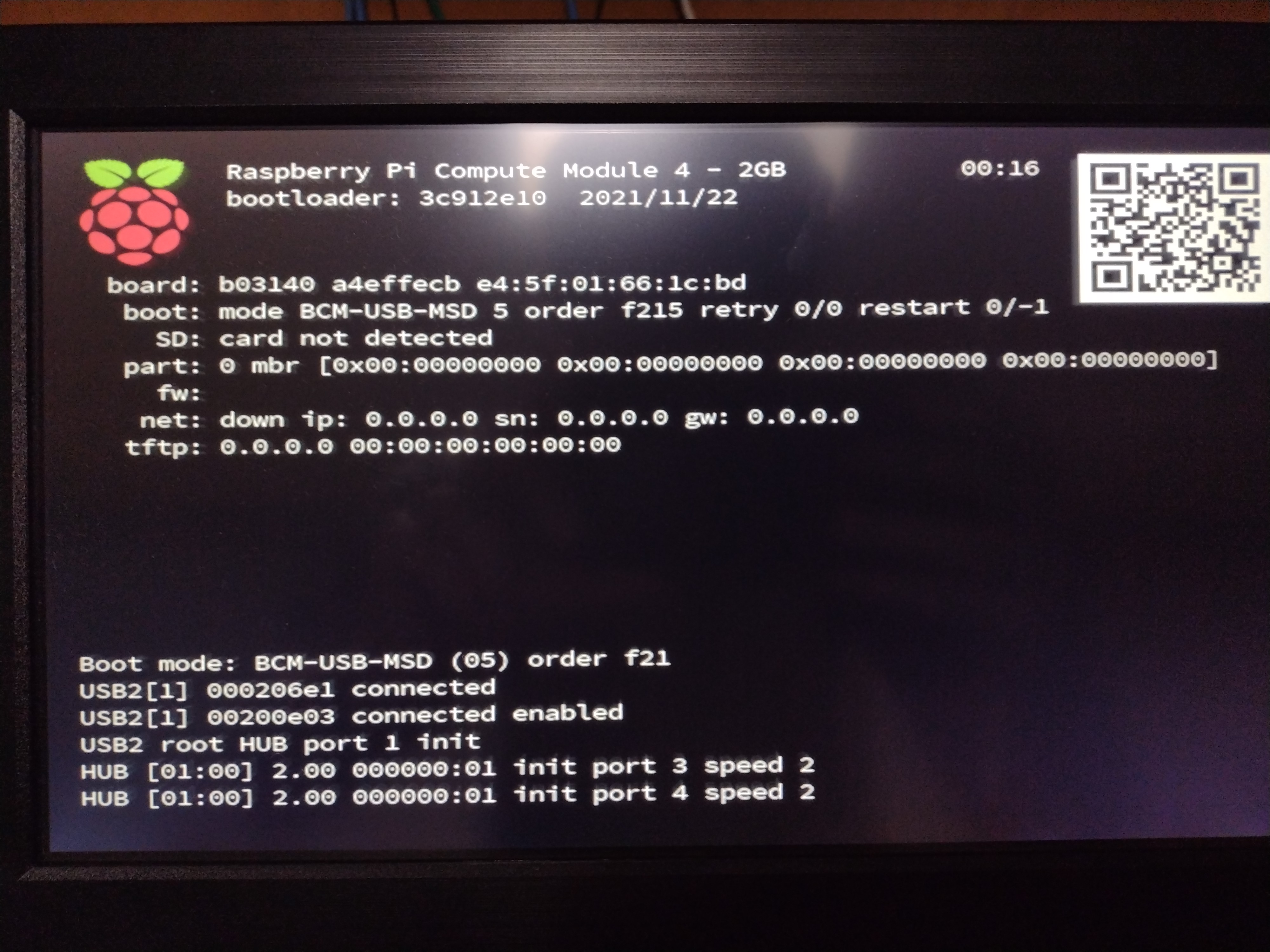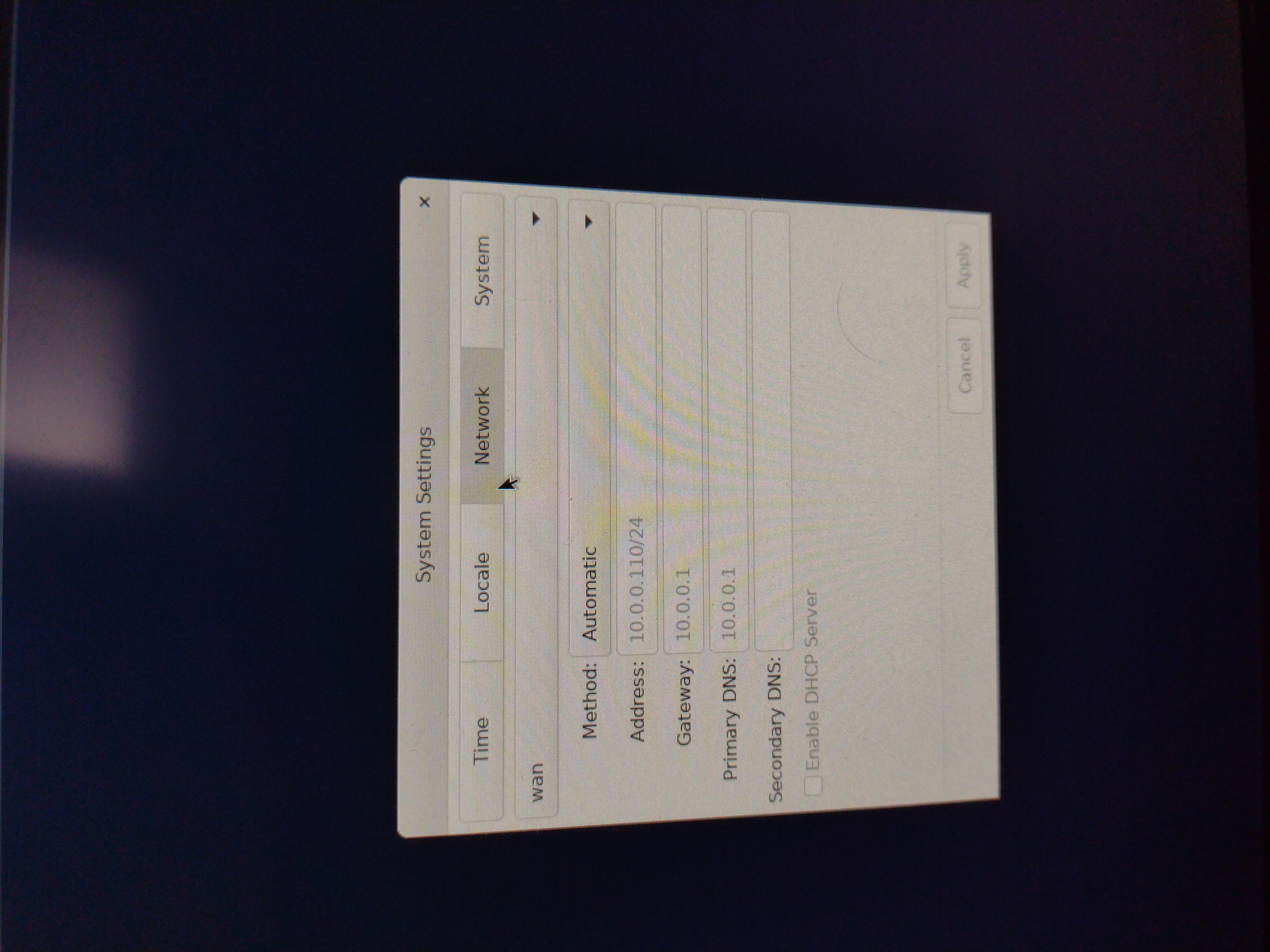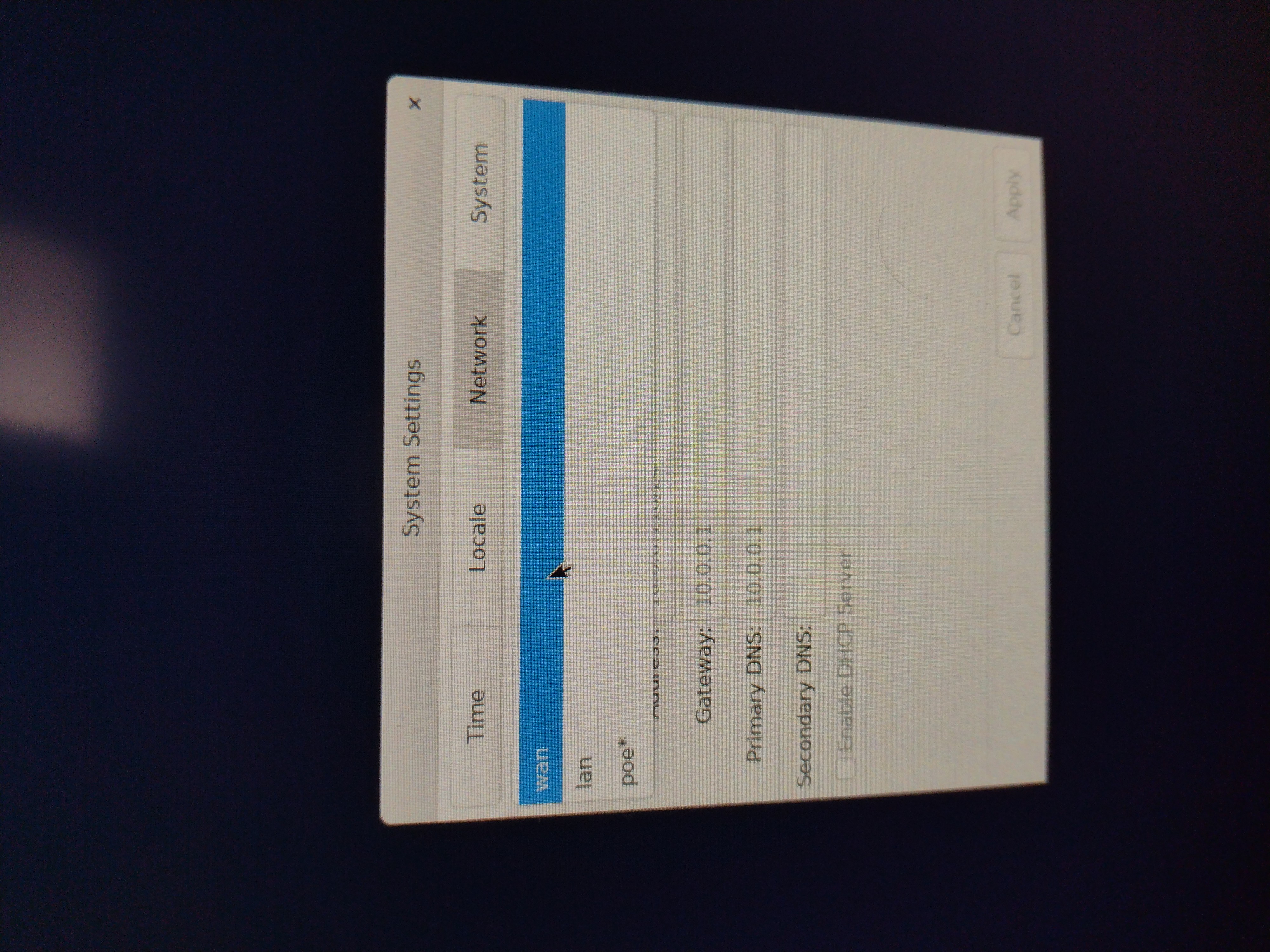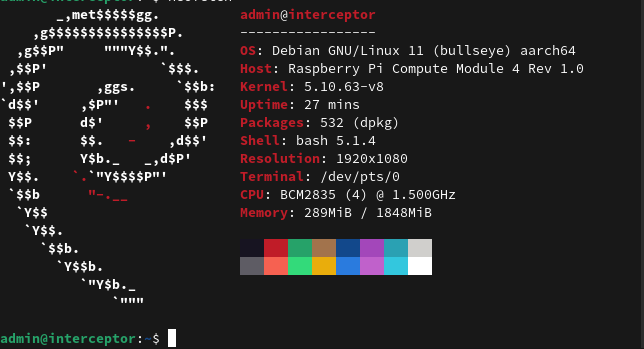10 minutes
Hands on with the Axzez Interceptor
Intro
I got my hands on the new Interceptor board from Axzez!

What is it?
The Interceptor is built on top of the Raspberry Pi Compute Module 4 Platform. Jeff Geerling did a video on it back in Februrary, detailing most of the product’s features. I won’t go into those features here. I want to go over the stock Interceptor OS and the experience I’ve had in my first few days.
Interceptor OS
Axzez provides an OS image you can install to a flash drive to get things started. When the Interceptor comes up, it first shows the familar Raspberry Pi boot screen:

Then a boot selector shows up:

I’ve already installed my OS on the internal eMMC of my Compute Module 4. But you can install it to a flash drive or a SATA drive. The install process is very straightforward and fast.
After a few systemd boot messages, you arrive at a wayfire desktop:

There’s a clock on the top-right and a menu bar in the top left. Here’s what the menu bar looks like:

… and a few of the setting screens:





The Network is the Computer
There are 4 Ethernet Jacks on the Interceptor. I’ve plugged my Ethernet cable into the ‘bottom left’ jack, which defaults to DHCP. In a follow-up blog I’ll be detailing more about these Ethernet Jacks and how they can be configured.
Running the obligatory neofetch reveals Interceptor OS runs a build based off of Debian Bullseye 64 Bit. My Compute Module 4 has 2 gigs of RAM:

Here’s what ifconfig looks like out of the box:
admin@interceptor:~$ ifconfig
eth0: flags=4163<UP,BROADCAST,RUNNING,MULTICAST> mtu 1500
inet6 fe80::e65f:1ff:fe66:1cbd prefixlen 64 scopeid 0x20<link>
ether e4:5f:01:66:1c:bd txqueuelen 1000 (Ethernet)
RX packets 15350 bytes 1162726 (1.1 MiB)
RX errors 0 dropped 0 overruns 0 frame 0
TX packets 10388 bytes 10078532 (9.6 MiB)
TX errors 0 dropped 0 overruns 0 carrier 0 collisions 0
lan: flags=4163<UP,BROADCAST,RUNNING,MULTICAST> mtu 1500
inet 10.90.0.1 netmask 255.255.255.0 broadcast 10.90.0.255
inet6 fe80::e65f:1ff:fe66:1cbd prefixlen 64 scopeid 0x20<link>
ether e4:5f:01:66:1c:bd txqueuelen 1000 (Ethernet)
RX packets 0 bytes 0 (0.0 B)
RX errors 0 dropped 0 overruns 0 frame 0
TX packets 25 bytes 1960 (1.9 KiB)
TX errors 0 dropped 0 overruns 0 carrier 0 collisions 0
lo: flags=73<UP,LOOPBACK,RUNNING> mtu 65536
inet 127.0.0.1 netmask 255.0.0.0
inet6 ::1 prefixlen 128 scopeid 0x10<host>
loop txqueuelen 1000 (Local Loopback)
RX packets 0 bytes 0 (0.0 B)
RX errors 0 dropped 0 overruns 0 frame 0
TX packets 0 bytes 0 (0.0 B)
TX errors 0 dropped 0 overruns 0 carrier 0 collisions 0
wan: flags=4163<UP,BROADCAST,RUNNING,MULTICAST> mtu 1500
inet 10.0.0.110 netmask 255.255.255.0 broadcast 10.0.0.255
inet6 fdb3:dd5c:79f7:0:e65f:1ff:fe66:1cbd prefixlen 64 scopeid 0x0<global>
inet6 fd32:db85:3f4f:0:e65f:1ff:fe66:1cbd prefixlen 64 scopeid 0x0<global>
inet6 fe80::e65f:1ff:fe66:1cbd prefixlen 64 scopeid 0x20<link>
inet6 fd38:65c3:b703:0:e65f:1ff:fe66:1cbd prefixlen 64 scopeid 0x0<global>
inet6 fd51:de9e:9c6d:0:e65f:1ff:fe66:1cbd prefixlen 64 scopeid 0x0<global>
ether e4:5f:01:66:1c:bd txqueuelen 1000 (Ethernet)
RX packets 15349 bytes 886374 (865.5 KiB)
RX errors 0 dropped 0 overruns 0 frame 0
TX packets 5897 bytes 9740025 (9.2 MiB)
TX errors 0 dropped 0 overruns 0 carrier 0 collisions 0
admin@interceptor:~$
How about PCI devices? We can see the Interceptor’s SATA controller:
admin@interceptor:~$ lspci
00:00.0 PCI bridge: Broadcom Inc. and subsidiaries BCM2711 PCIe Bridge (rev 20)
01:00.0 SATA controller: JMicron Technology Corp. JMB58x AHCI SATA controller
admin@interceptor:~$
lsblk with 5 miscellaneous drives and the onboard eMMC:
admin@interceptor:~$ lsblk
NAME MAJ:MIN RM SIZE RO TYPE MOUNTPOINT
sda 8:0 0 298.1G 0 disk
├─sda1 8:1 0 100M 0 part
└─sda2 8:2 0 298G 0 part
sdb 8:16 0 93.2G 0 disk
├─sdb1 8:17 0 7G 0 part
└─sdb2 8:18 0 86.2G 0 part
sdc 8:32 0 931.5G 0 disk
├─sdc1 8:33 0 931.5G 0 part
└─sdc9 8:41 0 8M 0 part
sdd 8:48 0 14.6T 0 disk
├─sdd1 8:49 0 14.6T 0 part
└─sdd9 8:57 0 8M 0 part
sde 8:64 0 14.6T 0 disk
├─sde1 8:65 0 14.6T 0 part
└─sde9 8:73 0 8M 0 part
mmcblk0 179:0 0 7.3G 0 disk
├─mmcblk0p1 179:1 0 100M 0 part
├─mmcblk0p2 179:2 0 348M 0 part /squashfs
└─mmcblk0p3 179:3 0 6.8G 0 part /
mmcblk0boot0 179:32 0 4M 1 disk
mmcblk0boot1 179:64 0 4M 1 disk
lsusb:
admin@interceptor:~$ lsusb
Bus 002 Device 001: ID 1d6b:0003 Linux Foundation 3.0 root hub
Bus 001 Device 004: ID 413c:2003 Dell Computer Corp. Keyboard SK-8115
Bus 001 Device 003: ID 046d:c03d Logitech, Inc. M-BT96a Pilot Optical Mouse
Bus 001 Device 002: ID 1a40:0101 Terminus Technology Inc. Hub
Bus 001 Device 001: ID 1d6b:0002 Linux Foundation 2.0 root hub
admin@interceptor:~$
ZFS
This OS comes with ZFS support already but it was hard to find. Trying zfs commands fail:
admin@interceptor:~$ zfs
-bash: zfs: command not found
admin@interceptor:~$ zpool
-bash: zpool: command not found
admin@interceptor:~$
…my first assumption was ZFS wasn’t installed. So I installed zfs-dkms….oh, that didn’t work. It needed linux-headers. And then it didn’t work again…and now ZFS won’t compile…ugh.
Oh! It turns out /sbin wasn’t in the path! Adding /sbin to my PATH in .bashrc was easy once I realized the problem.
admin@interceptor:~$ /sbin/zfs version
zfs-2.0.3-9
zfs-kmod-2.0.7-1
admin@interceptor:~$
I’ll be running more tests with zfs later. I’m curious how compression will play out (uncompressed vs lz4 vs zstd).
dd Tests
I ran a couple of benchmarks on the storage I have. The best drives I have in the Inteceptor right now are two refurbished Water Panther / Seagate Exos 16TB drives.
Doing a straight dd test on one of the drives from the beginning yields great results:
admin@interceptor:~$ sudo dd if=/dev/sde of=/dev/null bs=4M status=progress iflag=direct
1866465280 bytes (1.9 GB, 1.7 GiB) copied, 7 s, 266 MB/s^C
455+0 records in
454+0 records out
1904214016 bytes (1.9 GB, 1.8 GiB) copied, 7.15672 s, 266 MB/s
admin@interceptor:~$
How about both at the same time?
admin@interceptor:~$ sudo dd if=/dev/sdd of=/dev/null bs=4M status=progress iflag=direct
2860515328 bytes (2.9 GB, 2.7 GiB) copied, 14 s, 204 MB/s^C
724+0 records in
723+0 records out
3032481792 bytes (3.0 GB, 2.8 GiB) copied, 14.8491 s, 204 MB/s
admin@interceptor:~$
admin@interceptor:~$ sudo dd if=/dev/sde of=/dev/null bs=4M status=progress iflag=direct
3409969152 bytes (3.4 GB, 3.2 GiB) copied, 16 s, 213 MB/s^C
839+0 records in
838+0 records out
3514826752 bytes (3.5 GB, 3.3 GiB) copied, 16.4079 s, 214 MB/s
admin@interceptor:~$
…there’s a little slowdown, but not very significant. The CPU is hardly doing any work with this read test.
What happens if we read from all the drives at the same time?
avg-cpu: %user %nice %system %iowait %steal %idle
10.77 0.00 9.49 56.92 0.00 22.82
Device r/s rkB/s rrqm/s %rrqm r_await rareq-sz w/s wkB/s wrqm/s %wrqm w_await wareq-sz d/s dkB/s drqm/s %drqm d_await dareq-sz f/s f_await aqu-sz %util
mmcblk0 0.00 0.00 0.00 0.00 0.00 0.00 0.00 0.00 0.00 0.00 0.00 0.00 0.00 0.00 0.00 0.00 0.00 0.00 0.00 0.00 0.00 0.00
mmcblk0boot0 0.00 0.00 0.00 0.00 0.00 0.00 0.00 0.00 0.00 0.00 0.00 0.00 0.00 0.00 0.00 0.00 0.00 0.00 0.00 0.00 0.00 0.00
mmcblk0boot1 0.00 0.00 0.00 0.00 0.00 0.00 0.00 0.00 0.00 0.00 0.00 0.00 0.00 0.00 0.00 0.00 0.00 0.00 0.00 0.00 0.00 0.00
sda 83.00 85760.00 0.00 0.00 34.23 1033.25 0.00 0.00 0.00 0.00 0.00 0.00 0.00 0.00 0.00 0.00 0.00 0.00 0.00 0.00 2.84 100.80
sdb 64.00 65536.00 0.00 0.00 35.48 1024.00 0.00 0.00 0.00 0.00 0.00 0.00 0.00 0.00 0.00 0.00 0.00 0.00 0.00 0.00 2.27 100.00
sdc 83.00 84736.00 0.00 0.00 34.20 1020.92 0.00 0.00 0.00 0.00 0.00 0.00 0.00 0.00 0.00 0.00 0.00 0.00 0.00 0.00 2.84 99.60
sdd 84.00 86016.00 0.00 0.00 33.82 1024.00 0.00 0.00 0.00 0.00 0.00 0.00 0.00 0.00 0.00 0.00 0.00 0.00 0.00 0.00 2.84 100.00
sde 84.00 86016.00 0.00 0.00 33.65 1024.00 0.00 0.00 0.00 0.00 0.00 0.00 0.00 0.00 0.00 0.00 0.00 0.00 0.00 0.00 2.83 100.40
That gives us ~ 408 MB/s when doing a sequential read from these drives.
The CM4 PCIe 1x lane appears to be PCIe Gen 2.0, which has a therortical max of 4Gbps. That’s 500MB/s throughput. We’re getting close with my hodgepodge of drives.
Data Transfer
In my short amount of testing, transferring data with SSH/rsync is a bottleneck. The encryption takes up a whole core on the CM4 and hurts performance. I was only able to pull ~25MB/s over the network with rsync in my testing. Doing that same test over nfs is faster, but not significantly. More testing is needed.
iperf3
Speeds were close to 1Gbps:
admin@interceptor:~$ iperf3 -c justin-3900x -t 0
Connecting to host justin-3900x, port 5201
[ 5] local 10.0.0.110 port 42884 connected to 10.0.0.65 port 5201
[ ID] Interval Transfer Bitrate Retr Cwnd
[ 5] 0.00-1.00 sec 100 MBytes 842 Mbits/sec 0 359 KBytes
[ 5] 1.00-2.00 sec 98.7 MBytes 828 Mbits/sec 0 359 KBytes
[ 5] 2.00-3.00 sec 101 MBytes 849 Mbits/sec 0 359 KBytes
[ 5] 3.00-4.00 sec 101 MBytes 848 Mbits/sec 0 375 KBytes
[ 5] 4.00-5.00 sec 101 MBytes 846 Mbits/sec 0 375 KBytes
[ 5] 5.00-6.00 sec 101 MBytes 851 Mbits/sec 0 375 KBytes
[ 5] 6.00-7.00 sec 98.7 MBytes 828 Mbits/sec 0 375 KBytes
[ 5] 7.00-8.00 sec 101 MBytes 850 Mbits/sec 0 375 KBytes
[ 5] 8.00-9.00 sec 100 MBytes 841 Mbits/sec 0 375 KBytes
[ 5] 9.00-10.00 sec 100 MBytes 843 Mbits/sec 0 375 KBytes
^C[ 5] 10.00-10.38 sec 38.2 MBytes 851 Mbits/sec 0 375 KBytes
- - - - - - - - - - - - - - - - - - - - - - - - -
[ ID] Interval Transfer Bitrate Retr
[ 5] 0.00-10.38 sec 1.02 GBytes 843 Mbits/sec 0 sender
[ 5] 0.00-10.38 sec 0.00 Bytes 0.00 bits/sec receiver
iperf3: interrupt - the client has terminated
admin@interceptor:~$
admin@interceptor:~$ iperf3 -c justin-3900x -t 0 -R
Connecting to host justin-3900x, port 5201
Reverse mode, remote host justin-3900x is sending
[ 5] local 10.0.0.110 port 42888 connected to 10.0.0.65 port 5201
[ ID] Interval Transfer Bitrate
[ 5] 0.00-1.00 sec 111 MBytes 932 Mbits/sec
[ 5] 1.00-2.00 sec 112 MBytes 939 Mbits/sec
[ 5] 2.00-3.00 sec 112 MBytes 939 Mbits/sec
[ 5] 3.00-4.00 sec 112 MBytes 939 Mbits/sec
[ 5] 4.00-5.00 sec 111 MBytes 929 Mbits/sec
[ 5] 5.00-6.00 sec 112 MBytes 939 Mbits/sec
[ 5] 6.00-7.00 sec 112 MBytes 939 Mbits/sec
[ 5] 7.00-8.00 sec 112 MBytes 939 Mbits/sec
[ 5] 8.00-9.00 sec 112 MBytes 939 Mbits/sec
[ 5] 9.00-10.00 sec 112 MBytes 939 Mbits/sec
^C[ 5] 10.00-10.23 sec 26.1 MBytes 938 Mbits/sec
- - - - - - - - - - - - - - - - - - - - - - - - -
[ ID] Interval Transfer Bitrate
[ 5] 0.00-10.23 sec 0.00 Bytes 0.00 bits/sec sender
[ 5] 0.00-10.23 sec 1.12 GBytes 937 Mbits/sec receiver
iperf3: interrupt - the client has terminated
admin@interceptor:~$
Even when saturating the network (one way) I was able to pull ~400MB/s from my drives.
Power usage
With my 5 drive setup and an old 450 Watt power supply, it’s using ~54 Watts in total according to a kill-o-watt.
Conclusion
At $119 (formerly $99), the Interceptor Carrier Board is a wonderful little board. This is the board to get if you want an ARM workstation with massive data storage and network possibilities.
The processing power of the Compute Module 4 will disappoint many, but with proper configuration and tuning on a LAN network, that bottleneck can be reduced. If you need to do processing of data on the collection device, you’ll want to look elsewhere.
If you’re a hobbist like me, this board won’t disappoint. I’m excited to try projects like GlusterFS and Ceph on it, just to push its limits. Stay tuned for those blog posts.
Feel free to leave your comments or test cases you want me to try in the Github Discussion.
1935 Words
2022-04-26 00:00